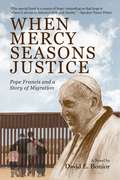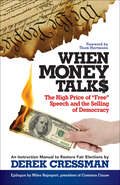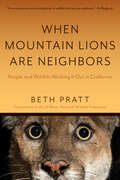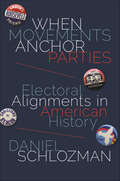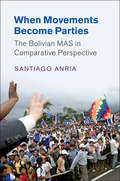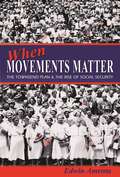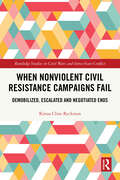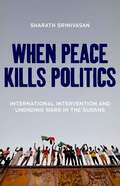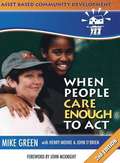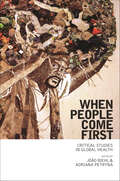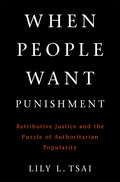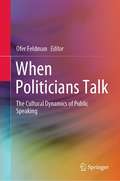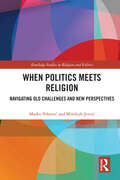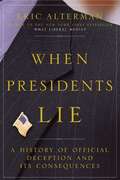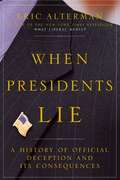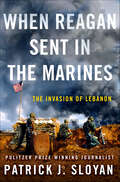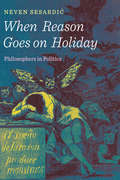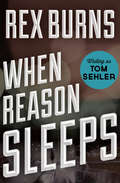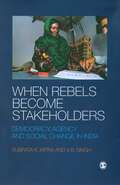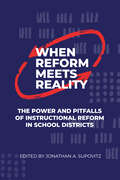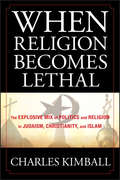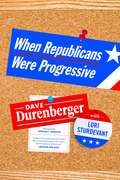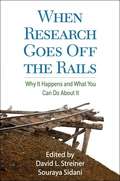- Table View
- List View
When Mercy Seasons Justice: Pope Francis and a Story of Migration (A Novel)
by David Edward BoniorWhen Mercy Seasons Justice is a powerful story of redemption, resilience, and humanity, set against the backdrop of the modern-day refugee crisis and Catholic Church scandals.In this moving debut novel, former Congressman David Bonior weaves together an inspiring story of two characters who dare to defy the status quo. The first is Pope Francis, the kind-hearted, unconventional leader who struggles to usher his church out of a crisis riddled with scandals. The second is Maria Elena, a Honduran mother desperate to save her four children from their terror-stricken community. As Maria and her children head north to seek asylum in McAllen, Texas, Francis grapples with unfaithful bishops and a male-dominated clergy, who rebel against the drastic changes the Church desperately needs. Just as Maria and her family must rely on the help of good Samaritans they meet along their journey—including an artistic gardener, two priests in the mold of Francis, and a New York Times reporter—Francis must seek the advice of his trusted aides, Father Soto and Sister Mary Vernard, to lead the Church through one of its biggest upheavals since the Reformation. Will Maria and her children survive their harrowing search for asylum? And, at this significant turning point in the history of the Church, will Pope Francis redefine his male-dominated papacy—and, ultimately, his legacy? When Mercy Seasons Justice is a timely narrative of hope, faith, and redemption, that intertwines the struggle of two parallel souls trying, despite all odds, to search for virtue and compassion in a world seemingly full of corruption.
When Money Talks: The High Price of "Free" Speech and the Selling of Democracy
by Thom Hartmann Derek CressmanSpecial-interest money is destroying our democratic process. But now that the Citizens United decision has thrown out campaign spending limits as abridgments of free speech, Americans want to know what they can do about it. Derek Cressman gives us the tools, both intellectual and tactical, to fight back. There's nothing inherently unconstitutional in limiting the amount of speech, Cressman insists. We do it all the time--for example, cities control when and where demonstrations can take place or how long people can speak at council meetings. Moreover, he argues that while you choose to patronize Fox News, MSNBC, the New York Times, or the Wall Street Journal, political advertising is forced upon you. It's not really free speech at all--it's paid speech. It's not at all what the Founders had in mind when they wrote the First Amendment.Cressman examines how courts have foiled attempts to limit campaign spending, details what a constitutional amendment limiting paid speech should say, and reveals an overlooked political tool concerned citizens can use to help gain the amendment's passage. Seven times before in our history we have approved constitutional amendments to overturn wrongheaded rulings by the Supreme Court--there's no reason we can't do it again.
When Mountain Lions Are Neighbors: People and Wildlife Working It Out in California (With a New Preface)
by Beth PrattNow updated with a new preface: a full-color celebration of coexistence with California's iconic wildlife.Wildness beats in the heart of California's urban areas, and across the state Californians are taking action to recast wildlife as an integral part of our everyday lives. In Los Angeles, residents rallied to build one of the largest wildlife crossings in the world because of the plight of one lonely mountain lion named P-22. Porpoises cavort in San Francisco Bay again because of a grassroots effort to clean up a waterway that was once a toxic mess. Yosemite's park staff and millions of visitors have mobilized to keep its famed bears wild. And after a near century-long absence, Californians are welcoming wolves back to the state, inspired by the remarkable journey of the wolf OR-7. When Mountain Lions Are Neighbors explores this evolving dynamic between humans and animals. Now updated with a new preface, these inspiring stories celebrate a new model for wildlife conservation: coexistence.
When Movements Anchor Parties: Electoral Alignments in American History (Princeton Studies in American Politics: Historical, International, and Comparative Perspectives)
by Daniel SchlozmanThroughout American history, some social movements, such as organized labor and the Christian Right, have forged influential alliances with political parties, while others, such as the antiwar movement, have not. When Movements Anchor Parties provides a bold new interpretation of American electoral history by examining five prominent movements and their relationships with political parties.Taking readers from the Civil War to today, Daniel Schlozman shows how two powerful alliances—those of organized labor and Democrats in the New Deal, and the Christian Right and Republicans since the 1970s—have defined the basic priorities of parties and shaped the available alternatives in national politics. He traces how they diverged sharply from three other major social movements that failed to establish a place inside political parties—the abolitionists following the Civil War, the Populists in the 1890s, and the antiwar movement in the 1960s and 1970s. Moving beyond a view of political parties simply as collections of groups vying for preeminence, Schlozman explores how would-be influencers gain influence—or do not. He reveals how movements join with parties only when the alliance is beneficial to parties, and how alliance exacts a high price from movements. Their sweeping visions give way to compromise and partial victories. Yet as Schlozman demonstrates, it is well worth paying the price as movements reorient parties' priorities.Timely and compelling, When Movements Anchor Parties demonstrates how alliances have transformed American political parties.
When Movements Become Parties: The Bolivian MAS in Comparative Perspective (Cambridge Studies in Comparative Politics)
by Santiago AnriaWhy do some parties formed by social movements develop top-down structures while others stay more open and responsive to their social bases? The first rigorous comparative study of movement-based parties, this book shows not only how movements can form parties but also how movements contribute to parties' internal politics and shape organizational party models over the long term. Although the existing literature argues that movement-based parties will succumb to professionalization and specialization, Anria shows that this is not inevitable or preordained through an in-depth examination of the unusual and counterintuitive development of Bolivia's MAS. Anria then compares the evolution of the MAS with that of other parties formed by social movements, including Brazil's PT and Uruguay's FA. In a region where successful new parties of any type have been rare, these three parties are remarkable for their success. Yet, despite their similar origins, they differ sharply in their organizational models.
When Movements Matter: The Townsend Plan and the Rise of Social Security (Princeton Studies in American Politics: Historical, International, and Comparative Perspectives #176)
by Edwin AmentaWhen Movements Matter accounts for the origins of Social Security as we know it. The book tells the overlooked story of the Townsend Plan--a political organization that sought to alleviate poverty and end the Great Depression through a government-provided retirement stipend of $200 a month for every American over the age of sixty. Both the Townsend Plan, which organized two million older Americans into Townsend clubs, and the wider pension movement failed to win the generous and universal senior citizens' pensions their advocates demanded. But the movement provided the political impetus behind old-age policy in its formative years and pushed America down the track of creating an old-age welfare state. Drawing on a wealth of primary evidence, historical detail, and arresting images, Edwin Amenta traces the ups and downs of the Townsend Plan and its elderly leader Dr. Francis E. Townsend in the struggle to remake old age. In the process, Amenta advances a new theory of when social movements are influential. The book challenges the conventional wisdom that U.S. old-age policy was a result mainly of the Depression or farsighted bureaucrats. It also debunks the current view that America immediately embraced Social Security when it was adopted in 1935. And it sheds new light on how social movements that fail to achieve their primary goals can still influence social policy and the way people relate to politics.
When Nonviolent Civil Resistance Campaigns Fail: Demobilized, Escalated and Negotiated Ends (Routledge Studies in Civil Wars and Intra-State Conflict)
by Kirssa Cline RyckmanThis book examines both how and why nonviolent civil resistance campaigns fail, and the diverse category of campaigns that fall short.Civil resistance campaigns are known for their success, for their ability to overthrow central governments or gain territorial independence. There have been a growing number of civil resistance campaigns in recent decades; however, their rate of success has decreased. More unarmed campaigns are now ending without achieving their ultimate political goals. This study moves beyond the success or failure dichotomy to unpack how nonviolent campaigns end, while also paying attention to the processes that encourage conflict demobilization or transformation. Drawing from the fields of political science, sociology, and nonviolence studies, the book develops a continuum of campaign outcomes that includes full and partial success as forms of positive demobilization as well as disbanding and defeat as forms of negative demobilization. It provides an overarching framework that links sources of internal campaign strength to termination types, and then considers each outcome in depth to explore the reasons why and how campaigns demobilize. The work is global in scope, including descriptive statistics, quantitative analyses, and case illustrations spanning a variety of regions and time periods, from East Germany in 1953 to Suriname in 1984 and Togo in 2013.This book will be of much interest to students of civil resistance movements and nonviolence, conflict studies, intrastate conflicts, and International Relations.
When Peace Is Not Enough: How the Israeli Peace Camp Thinks about Religion, Nationalism, and Justice
by Atalia OmerThe state of Israel is often spoken of as a haven for the Jewish people, a place rooted in the story of a nation dispersed, wandering the earth in search of their homeland. Born in adversity but purportedly nurtured by liberal ideals, Israel has never known peace, experiencing instead a state of constant war that has divided its population along the stark and seemingly unbreachable lines of dissent around the relationship between unrestricted citizenship and Jewish identity. aBy focusing on the perceptions and histories of IsraelOCOs most marginalized stakeholdersOCoPalestinian Israelis, Arab Jews, and non-Israeli JewsOCoAtalia Omer cuts to the heart of the Israeli-Arab conflict, demonstrating how these voices provide urgently needed resources for conflict analysis and peacebuilding. Navigating a complex set of arguments about ethnicity, boundaries, and peace, and offering a different approach to the renegotiation and reimagination of national identity and citizenship, Omer pushes the conversation beyond the bounds of the single narrative and toward a new and dynamic concept of justiceOCoone that offers the prospect of building a lasting peace.
When Peace Kills Politics: International Intervention and Unending Wars in the Sudans
by Sharath SrinivasanWhy have war and coercion dominated the political realm in the Sudans, a decade after South Sudan's independence and fifteen years after the Comprehensive Peace Agreement? This book explains the tragic role of international peacemaking in reproducing violence and political authoritarianism in Sudan and South Sudan. <p><p> Sharath Srinivasan charts the destructive effects of Sudan's landmark north-south peace process, from how it fuelled war in Darfur, the Nuba Mountains and the Blue Nile to its contribution to Sudan's failed political transformation and South Sudan's rapid descent into civil war. Concluding with the conspicuous absence of 'peace' when non-violent revolutionary political change came to Sudan in 2019, Srinivasan examines at close range why outsiders' peace projects may displace civil politics and raise the political currency of violence. <p><p> This is an analysis of the perils of attempting to build a non-violent political realm through neat designs and tools of compulsion, where the end goal of peace becomes caught up in idealised constitutional texts, technocratic templates and deals on sharing spoils. When Peace Kills Politics shows that these methods, ultimately anti-political, will be resisted—often violently—by dissatisfied local actors.
When People Care Enough to Act (Second Edition)
by Mike Green Henry Moore John W. O'BrienEnriching each other, this book provides a clear exposition of ABCD (Asset Based Community Development) organizing principles & best practices for community partnership. Examples of ABCD in Action, learning exercises, worksheets, and reflections from experienced practitioners of ABCD community building. A practical approach to creating community collaborations that work. Reflections by John McKnight; Lessons from Ashville, NC; Marquette, MI; Laconia, NH; Savannah, GA; Ames, IA.
When People Come First: Critical Studies in Global Health
by João Biehl & Adriana PetrynaA people-centered approach to global healthWhen People Come First critically assesses the expanding field of global health. It brings together an international and interdisciplinary group of scholars to address the medical, social, political, and economic dimensions of the global health enterprise through vivid case studies and bold conceptual work. The book demonstrates the crucial role of ethnography as an empirical lantern in global health, arguing for a more comprehensive, people-centered approach.Topics include the limits of technological quick fixes in disease control, the moral economy of global health science, the unexpected effects of massive treatment rollouts in resource-poor contexts, and how right-to-health activism coalesces with the increased influence of the pharmaceutical industry on health care. The contributors explore the altered landscapes left behind after programs scale up, break down, or move on. We learn that disease is really never just one thing, technology delivery does not equate with care, and biology and technology interact in ways we cannot always predict. The most effective solutions may well be found in people themselves, who consistently exceed the projections of experts and the medical-scientific, political, and humanitarian frameworks in which they are cast.When People Come First sets a new research agenda in global health and social theory and challenges us to rethink the relationships between care, rights, health, and economic futures.
When People Want Punishment: Retributive Justice and the Puzzle of Authoritarian Popularity
by Lily L. TsaiAgainst the backdrop of rising populism around the world and democratic backsliding in countries with robust, multiparty elections, this book asks why ordinary people favor authoritarian leaders. Much of the existing scholarship on illiberal regimes and authoritarian durability focuses on institutional explanations, but Tsai argues that, to better understand these issues, we need to examine public opinion and citizens' concerns about retributive justice. Government authorities uphold retributive justice - and are viewed by citizens as fair and committed to public good - when they affirm society's basic values by punishing wrongdoers who act against these values. Tsai argues that the production of retributive justice and moral order is a central function of the state and an important component of state building. Drawing on rich empirical evidence from in-depth fieldwork, original surveys, and innovative experiments, the book provides a new framework for understanding authoritarian resilience and democratic fragility.
When Police Kill
by Franklin E. ZimringFranklin Zimring compiles data from federal records, crowdsourced research, and investigative journalism to provide a comprehensive, fact-based picture of how, when, where, and why police use deadly force. He offers prescriptions for how federal, state, and local governments could reduce killings at minimum cost without risking officers’ lives.
When Politicians Talk: The Cultural Dynamics of Public Speaking
by Ofer FeldmanThis book details the relationship between culture and the language used by public figures, including politicians, political candidates, and government officials, in the broad context of political behavior and communication. Employing a variety of perspectives, theoretical, conceptual, methodological, and analytical approaches, chapters focus specifically on the question of HOW cultural factors (such as religion, history, economy, majority/minority relations, social structure, and values) shape the content, nature, and characteristics of the rhetoric that public figures utilize in selected countries in the Americas, Europe, Asia, Oceania, and the Middle East. The chapters enable comparison of the cultural effects on the different structures, styles, and contents of public speaking in societies from West to East. That is, of WHAT leaders say, HOW they say it (e.g., degree of openness, directness, usage of metaphors and slogans, xenophobic and racial expressions), under WHICH specific circumstances (e.g., National Days addresses, national or local assemblies’ debates, during election campaigns appeals, press conferences’ briefings, and in international meetings’ speeches), and for WHAT specific audiences (e.g., supporters and voters, media representatives, or the global community).
When Politics Meets Religion: Navigating Old Challenges and New Perspectives (Routledge Studies in Religion and Politics)
by Miroljub Jevtić Marko VekovićWhen Politics Meets Religion presents a fresh exploration of the relationship between religion and politics worldwide.The volume includes topics covering Europe, such as the European far right, the contours of "European identity", and how religious cleavages affect value orientation of Europeans. It also covers country-focused issues and events, such as the influence of Orthodox Christianity in Russia, Christian nationalism in the United States, the influence of religion on Turkish foreign policy, the political role of the Catholic Church in the Philippines, Chinese attitudes towards religious deprivatization, and how liberation theology found its way from Latin America to the Holy Land. The volume is supplemented with several analyses on the intersection between law, society, and religion. It deals with religious mediation and political conflicts, how the current religious governance in France affects the Orthodox Jewish community, as well as how taxing the church’s economic activities can be a contributor to the common good, and why Muslims should treat Sharia law as only a moral code in the context of the Universal Declaration of Human Rights.Through rigorous research, case studies, and critical analysis, this volume explains how religion and politics mix in different settings, and why it is important for us to study this complex relationship. The volume will appeal to scholars and graduate students of political science and religious studies, as well as interested professionals working for non-governmental organizations (NGOs) or governments.
When Presidents Lie: A History of Official Deception and Its Consequences
by Eric AltermanAlterman (English, City U. of New York-Brooklyn College) helps dispel two myths: that US presidents would never lie to the people; and that presidential lying began only with the current occupant of the position. Having a mere 500 pages, he does not go back farther than Franklin D. Roosevelt, and leaves out all the subsequent presidents except Truman, Kennedy, Johnson, Reagan, and of course Bush the second. Annotation ©2004 Book News, Inc. , Portland, OR (booknews. com)
When Presidents Lie
by Eric AltermanLying has become pervasive in American life-but what happens when the falsehoods are perpetrated by the Oval Office? As the lies told by our government become more and more intricate, they begin to weave a tapestry of deception that creates problems far larger than those lied about in the first place. Eric Alterman's When Presidents Lieis a compelling historical examination of four specific post-World War II presidential lies whose consequences were greater than could ever have been predicted. FDR told the American people that peace was secure in Europe, setting the stage for McCarthyism and the cold war. John F. Kennedy's unyielding stance during the Cuban missile crisis masked his secret deal with the Soviet Union. Misrepresented aggression at the Gulf of Tonkin by the North Vietnamese gave LBJ the power to start a war. Finally, Ronald Reagan's Central American wars ended in the ignominy of the Iran-contra scandal. In light of George W. Bush's war in Iraq, which Alterman examines in the book's conclusion, When Presidents Lieis a warning-one more relevant today than ever before-that the only way to prevent these lies is America's collective demand for truth.
When Reagan Sent in the Marines: The Invasion of Lebanon
by Patrick J. Sloyan"In this formidable narrative, the prize-winning and super honest reporter, Patrick Sloyan, adds the depth of a scholar's context to produce a gripping reminder of why we should never forget history. He makes readers feel like they were eye witnesses." —Ralph NaderFrom a Pulitzer Prize-winning journalist who reported on the events as they happened, an action-packed account of Reagan's failures in the 1983 Marines barracks bombing in Beirut. On October 23, 1983, a truck bomb destroyed the U.S. Marines barracks in Beirut. 241 Americans were killed in the worst terrorist attack our nation would suffer until 9/11. We’re still feeling the repercussions today.When Reagan Sent In the Marines tells why the Marines were there, how their mission became confused and compromised, and how President Ronald Reagan used another misguided military venture to distract America from the attack and his many mistakes leading up to it.Pulitzer Prize-winning author Patrick J. Sloyan uses his own contemporaneous reporting, his close relationships with the Marines in Beirut, recently declassified documents, and interviews with key players, including Reagan’s top advisers, to shine a new light on the Israeli invasion of Lebanon and Reagan’s doomed ceasefire in Beirut. Sloyan draws on interviews with key players to explore the actions of Kissinger and Haig, while revealing the courage of Marine Colonel Timothy Geraghty, who foresaw the disaster in Beirut, but whom Reagan would later blame for it.More than thirty-five years later, America continues to wrestle with Lebanon, the Marines with the legacy of the Beirut bombing, and all of us with the threat of Mideast terror that the attack furthered. When Reagan Sent In The Marines is about a historical moment, but one that remains all too present today.
When Reason Goes on Holiday: Philosophers in Politics
by Neven SesardicPhilosophers usually emphasize the importance of logic, clarity and reason. Therefore when they address political issues they will usually inject a dose of rationality in these discussions, right?Wrong. This book gives a lot of examples showing the unexpected level of political irrationality among leading contemporary philosophers. The body of the book presents a detailed analysis of extreme leftist views of a number of famous philosophers and their occasional descent into apology for-and occasionally even active participation in-totalitarian politics. Most of these episodes are either virtually unknown (even inside the philosophical community) or have received very little attention.The author tries to explain how it was possible that so many luminaries of twentieth-century philosophy, who invoked reason and exhibited rigor and careful thinking in their professional work, succumbed to irrationality and ended up supporting some of the most murderous political regimes and ideologies. The huge leftist bias in contemporary philosophy and its persistence over the years is certainly a factor but it is far from being the whole story.Interestingly, the indisputably high intelligence of these philosophers did not actually protect them from descending into political insanity. It is argued that, on the contrary, both their brilliance and the high esteem they enjoyed in the profession only made them more self-confident and less cautious, thereby eventually making them blind to their betrayal of reason and the monstrosity of the causes they defended.
When Reason Sleeps
by Rex BurnsA forcibly retired marine investigates the disappearance of a young girlLieutenant-Colonel Jack Steele is too honest for Washington. If any other Marine Corps investigator had noticed a congressman&’s corruption, he might have kept his mouth shut. But Steele knows his ultimate duty and blows the whistle on a treasonous lawmaker, earning himself a pat on the back and a swift kick out the door. Steele returns to his hometown of San Diego, hoping for a quiet retirement. Instead he finds a chilling mystery that will make him question everything about the country he spent so long trying to protect. While helping a friend search for his missing granddaughter, Steele makes his way to Colorado. There he uncovers a sinister satanic cult, whose acolytes relish sacrificial death, and who won&’t think twice about trying to take out an honorable ex-marine.
When Rebels Become Stakeholders: Democracy, Agency and Social Change in India
by Subrata K Mitra V B SinghWhen Rebels Become Stakeholders: Democracy, Agency and Social Change in India explores the agency of ordinary men and women in the making of democratic social change in India. The study is specific to India, but the issues that it examines are of wider significance. The authors join the debate on democracy and development on the basis of case studies that showcase the opinions and attitudes of the Indian voter. They assert that mass perception of institutions, policies and processes—so often dismissed as mere false consciousness or as the conditioned reflex of a gullible public, manipulated by the rhetoric of populist politicians—is our only window to the inner dynamics of democracy and social change. The authors have used the public opinion data from three national surveys of the Indian electorate held in 1971, 1996 and 2004 to focus on the political understanding of India’s voters and their leaders. While agency is a much-discussed theme in contemporary social sciences, connecting the rationality of ordinary men and women to explain electoral participation and rapid structural change in the lives of people of this country is specific to this study. This book argues that the cohabitation of democracy and social change in India is not merely incidental or coincidental; rather the two are institutionally linked in a manner that is fundamentally causal, to the extent that the weakening of the one renders the other ineffective. This book would be of interest to researchers and scholars of political science, international relations, democracy, Indian politics, political analysts, sociology, development studies, journalism, comparative politics and public administration.
When Reform Meets Reality: The Power and Pitfalls of Instructional Reform in School Districts
by Jonathan A. SupovitzAn insightful inside perspective on the implementation of instructional improvement measures in a large urban K–12 district
When Religion Becomes Lethal
by Charles KimballA compelling look at today's complex relationship between religion and politics In his second book, bestselling author Charles Kimball addresses the urgent global problem of the interplay between fundamentalist Abrahamic religions and politics and moves beyond warning signs (the subject of his first book) to the dangerous and lethal outcomes that their interaction can produce. Drawing on his extensive personal and professional knowledge of, experience with and access to all three traditions, Kimball's explanation of the multiple ways religion and politics interconnect within Judaism, Christianity, and Islam will illuminate the problems and give readers a hopeful vision for how to chart a safer course into a precarious future. Kimball is the author of When Religion Becomes Evil, one of the most acclaimed post 9/11 books on terrorism and religion Reveals why religion so often leads to deadly results The author has scholarly knowledge and expertise and extensive personal experience with the peoples, cultures, and leaders involved Readable and engaging, this book gives a clear picture of today's complex political and religious reality and offers hope for the future.
When Republicans Were Progressive
by Dave Durenberger Lori Sturdevant Norm OrnsteinThe Republican Party has dominated Minnesota’s politics for much of the state's history. Today's party, though, is very different from the progressive Republican Party that came to power with Harold Stassen in 1938, had its heyday in the middle of the twentieth century, and faded into near-obscurity by the 1990s. But from the ideas and ideals of that dynamic political movement sprang modern Minnesota's success story. Minnesota's progressive Republican Party stood not for big or small government but for effective government. Issues that are anathema to today's GOP—environmental protection, assistance for vulnerable citizens, and economic opportunity for low-wage workers and the middle class—were at the heart of the party's agenda. Minnesota Republicans held that working across the aisle was a mark of strength, not of weakness or disloyalty. Senator Dave Durenberger grew up in and helped build that party. In this powerful work of history and witness, he explains how Minnesota's progressive Republicans earned voters' trust and delivered on their promises—and how progressive ideas fell out of favor when an increasingly anti-government, anti-tax national party shifted Minnesota Republican thinking to the right. In the ensuing partisan realignment, both the Republican and the Democratic parties have lost public trust. With eloquence and insight, Durenberger argues that the principles and practices of progressive Republicanism are a fitting remedy for what ails American democracy today.
When Research Goes Off the Rails
by David Streiner Souraya SidaniFew behavioral or health science studies proceed seamlessly. This refreshingly candid guide presents firsthand vignettes of obstacles on the bumpy road of research and offers feasible, easy-to-implement solutions. Contributors from a range of disciplines describe real-world problems at each stage of a quantitative or qualitative research project from gaining review board approval to collecting and analyzing data and discuss how these problems were resolved. A detailed summary chart helps readers quickly find material on specific issues, methods, and settings. Written with clarity and wit, the vignettes provide exemplars of critical thinking that researchers can apply when developing the operational plan of a study or when facing practical difficulties in a particular research phase.
